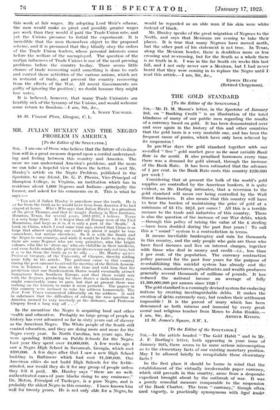MR. JULIAN HUXLEY AND THE NEGRO PROBLEM IN AMERICA
[To the Editor of the SPECTATOR.] SIR,—I am one of those who believe that the future of civiliza• t ion will in a great measure depend upon a cordial understand- ing and feeling between this country and America. The more we can understand America's problems, and the more we can take a hopeful view of them the better. I sent Mr. Huxley's article on the Negro Problem, published in the Spectator, to my friend, Dr. G. P. Phenix, Vice-Principal of Hampton College, in Virginia, an institution which has in residence about 1,000 Negroes and Indians—principally the former, and asked for his comments on it. This is what he says :— " You ask if Julian Huxley is anywhere near the truth. He is es far from the truth as he would have been from America if he had stayed at honie. Who's Who says that Julian Huxley is a grandson of the great Thomas, and that ho taught Zoology in Rice Institute, Houston, Texas, for several years, 1912-1916, I believe. Texas is a very large State. It is larger than all Europe west of the Ural Mountains, and large as it is, it is only a part of the South.' A book on China, which I read some time ago, stated that China is so large that almost anything one could say about it might be true somewhere, but untrue elsewhere. So it is with the South and the Negro in our country, and while it would be futile to deny that there are some Negroes who are very primitive, who like bright colours, who like to ' dress up,' who are childlike in their intellects, and even feeble-minded, the picture he draws is not only not true, but it is so far from the truth as to be silly . . . Mr. Huxley quete3 Prefer-For Gregory, of the University of Glasgow, thereby adding more folly to his article. The professor came to this country during tho past summer to attend the meeting of,the British Associa- tion in Toronto. I saw him at the time and told him that his prediction that our South-eastern States would eventually attract immigrants from Southern Europe, and that these would mix ty ith the Ne*roes. producing for these States a dark-skinned race, might conceivably come to pass, but that at present there was nothing on the horizon to make it seem probable. The papers in this country were inclined to take his address humorously. The New York Times commented editorially on the address. It said in substance that the difficulties of solving the race question in America seemed to vary inversely as the distance, and Professor Gregory lived a long IA ay off . . ."
In the meantime the Negro is acquiring land and other -vealth and education. Probably no large group of people in history has ever advanced so far in sixty years out of slavery as the American Negro. The White people of the South still control education, and they are doing more and more for the Negro every year. In North Carolina, ten years ago, they were spending $250,000 on Public Schools, for the Negro. Last year they spent over $4,000,000. A few weeks ago I saw a NegrO High School in Savannah, Georgia, which cost $500,000. A few days after that I saw a new High School building in Baltimore whicl had cost $1,500,000. Our American cities do not build High Schools for the feeble- minded, nor ,would they do it for any group of people unless they felt it paid. Mr. Huxley says " there are no well- authenticated cases of pure blacks rising to any eminence." Dr. Moton, Principal of Tuskegee, is a pure Negro, and is probably the ablest. Negro in this country. I have known him well for twenty years, He is not only able for a Negro, he
would be regarded as an able man if his skin were white instead of black.
Mr. Huxley speaks of the great migration of Negroes to the North, and says that Mexicans are coming to take their places. It is true that many Negroes have moved north,' but the other part of his statement is not true. In Texas, along the Mexican border, there is doubtless more or less crossing and re-crossing, but for the South as a whole there is no truth in it. I was in the far South six weeks this last - fall, and I not only never saw a Mexican, but I had never heard that they were coming in to replace the Negro until I read this article.—I am, Sir, &c.,
EDWIN HEATH
(Retired Clergyman).










































 Previous page
Previous page